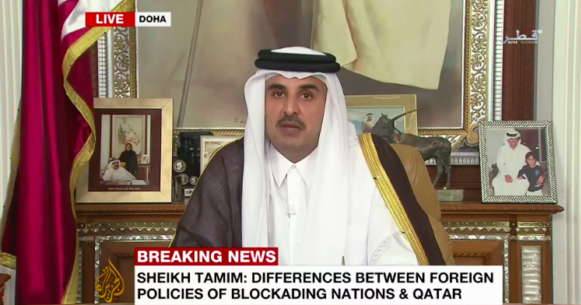Qatar Emir Sheikh Tamim bin Hamad Al Thani says mutual respect for Qatar's sovereignty and respectful dialogue are critical if the Saudi-led regime wish to resolve the ongoing crisis.
In his first public remarks broadcast on television on Friday night since the Persian Gulf dispute erupted in early June, the Emir called the blockade "collective punishment" and an assault on free speech.
"We should not burden civilians with political differences," he said, adding that world has chosen to stand with Qatar by not backing the boycotting nations.
The Emir said that Qatar is "fighting terrorism relentlessly and without compromises, and the international community recognizes this."
He added, "We are open to dialogue to find solutions to lingering problems, within the framework of respect for the sovereignty."
He concluded with a call for Arab unity and expressed solidarity with Palestinians who have recently seen the closure of Al Aqsa mosque.
Pivoting away from his neighbors, he also thanked Qatar residents for becoming de facto spokespeople for the country.
Additionally, Sheikh Tamim urged them to use the crisis as an opportunity and a wakeup call.
"We are opening our economy to initiatives, investments, production of food, medicine and ultimately to diversify our sources of income," the Emir said.
The speech comes a day after Qatar's ruler issued a decree setting new rules for defining terrorism, freezing funding and terrorism financing, and established national terrorism lists.
The Emir's speech also comes a day after the government confirmed the UAE was involved in a cyberattack that kicked off the Persian Gulf dispute.
Following the hacking of QNA, Saudi Arabia, the UAE, Bahrain and Egypt cut economic and diplomatic ties with Qatar.
The quartet hoped the move would pressure Qatar to accept 13 demands that included closing Al Jazeera and a Turkish military base in Doha, downgrading ties with neighboring Iran and severing ties with Palestinian Hamas movement among other things.
Meanwhile, a Qatari government officials said on Wednesday that the four Arab countries blockading it have acted dangerously and in a "disorganized manner" after apparently changing their demands.
Saudi Arabia, the United Arab Emirates, Egypt and Bahrain said Tuesday that Qatar should commit to six principles on combatting "terrorism" and negotiate a plan to implement them. The four countries had initially made 13 sweeping demands which Qatar dismissed as an infringement on its sovereignty.
Sheikh Saif bin Ahmed Al Thani, director of the Qatari government's communications office, said the four countries have "regularly issued conflicting statements".
LINK: https://www.ansarpress.com/english/7638
TAGS:































 online news tv
online news tv




